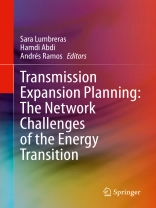This book presents a panoramic look at the transformation of the transmission network in the context of the energy transition. It provides readers with basic definitions as well as details on current challenges and emerging technologies. In-depth chapters cover the integration of renewables, the particularities of planning large-scale systems, efficient reduction and solution methods, the possibilities of HVDC and super grids, distributed generation, smart grids, demand response, and new regulatory schemes. The content is complemented with case studies that highlight the importance of the power transmission network as the backbone of modern energy systems. This book will be a comprehensive reference that will be useful to both academics and practitioners.
قائمة المحتويات
Chapter 1. Introduction: The key role of the transmission network.- Chapter 2. Metaheuristics for Transmission Network Expansion Planning.- Chapter 3. The Transmission Network Expansion Planning of large power system.- Chapter 4. Reduction techniques for TEP problems.- Chapter 5. Offshore grid development as a particular case of TEP.- Chapter 6. HVDC in future power systems.- Chapter 7. Transmission Expansion Planning Outside the Box: A Bilevel Approach.- Chapter 8. Impact of distributed energy resources in the networks.- Chapter 9. Stability considerations for transmission system planning.- Chapter 10. The regulation of the expansion of electricity transmission.- Chapter 11. Energy Storage Systems in Transmission Expansion Planning.
عن المؤلف
Sara Lumbreras holds a Ph D and a MSc Eng from Universidad Pontificia Comillas. She is an associate professor at the Institute for Research in Technology at the ICAI School of Engineering. Her research focuses on the development and application of decision support techniques for complex problems, mainly in the energy sector and in particular in grid design. She specializes in stochastic optimization (classical and based on metaheuristics) and in risk management. She is the author of over forty publications and has participated in a series of projects with private companies and public institutions, such as the European Commission. She is a member of the board of the Chair of Science, Technology and Religion, where she studies the evolving nature of the links between technology and society.
Hamdi Abdi was born in Paveh, Iran, in July1973. He received the B.Sc. degree from Tabriz University, Tabriz, Iran, in 1995, and the M.Sc. and Ph.D. degrees from Tarbiat Modares University, Tehran, Iran, in 1999 and 2006, respectively, all in electrical engineering. He is currently an Associate Professor in the Department of Electrical Engineering, Razi University, Kermanshah, Iran. His research interests include power system optimization, operation and planning, smart grids, demand response, multi-carrier energy systems, energy hubs, load forecasting, and design of electrical and control systems for industrial plants.
Andrés Ramos received the degree of Electrical Engineer from Universidad Pontificia Comillas, and his Ph D degree from Universidad Politécnica de Madrid. From 1982 to 1984, he was a research assistant at the Instituto Tecnológico para Postgraduados. Since 1984, Dr. Ramos has been at the Universidad Pontificia Comillas, where he is currently a Full Professor in the Industrial Organization Department, and at the Instituto de Investigación Tecnológica. He is Director of the MBA in the Global Energy Industry, and from 1999to 2008 was Director of the Industrial Organization Department. He has been a Visiting Scholar at Stanford University, Massachusetts Institute of Technology, and Aalborg University. Dr. Ramos is a referee for various international journals and conferences and the National Agency for Research Projects Evaluation, and is a member of several professional associations. His areas of interest include operations, planning and economy of electric energy systems, application of operations research to electric energy systems, and software development.












